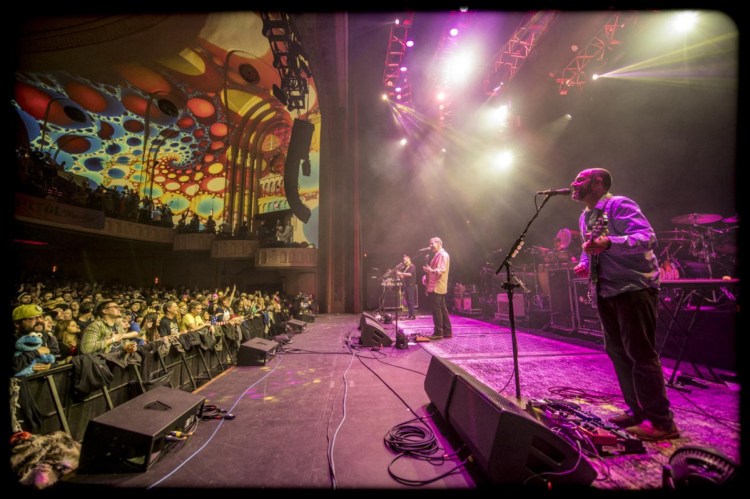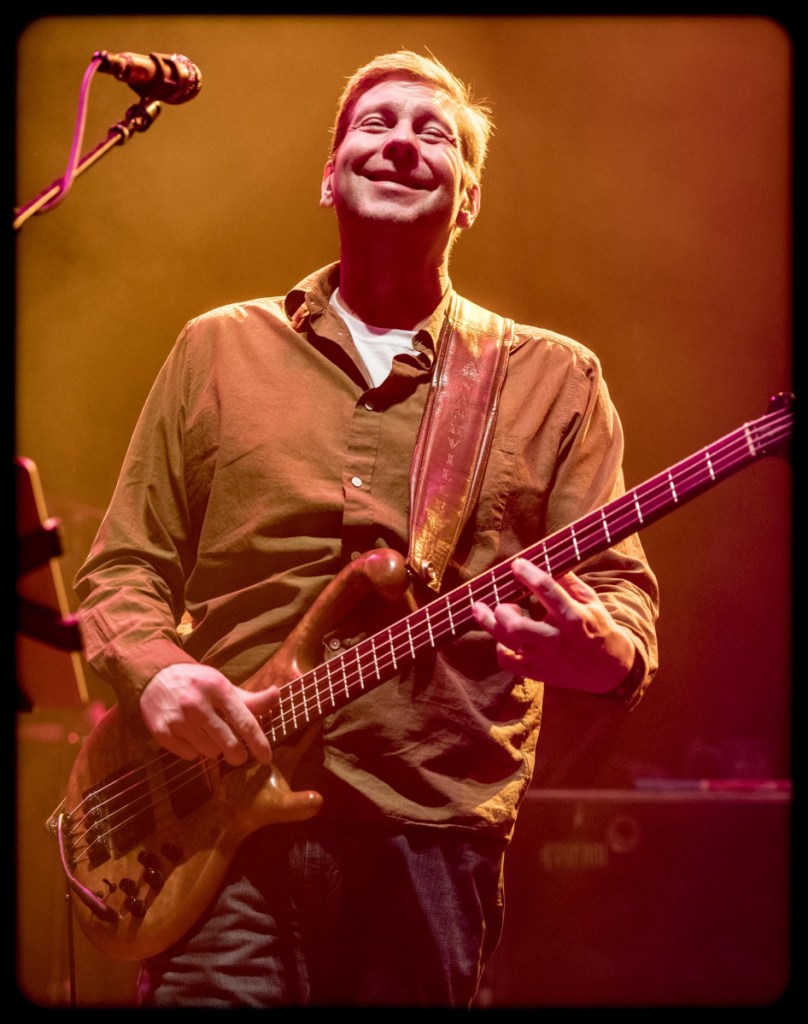Rob Derhak was on a conference call with the other members of the jam band Moe. last July when he was interrupted by a call from his doctor.
He put his bandmates on hold and listened to the doctor tell him he had nasopharyngeal cancer, a rare cancer of the upper throat area. Singing, and playing bass, is how he’s made his living for most of his adult life. Having cancer was stunning enough, but to have it in his throat seemed somewhat surreal.
“I went back to the call with the band and just listened to them. I was in shock. I sort of laughed to myself, thinking ‘I can’t believe I have cancer,’ ” said Derhak, 49, who lives in Falmouth. “I didn’t say anything for, like, an hour, which is unusual for me. I’m usually just throwing my opinions around. Finally, I just told them.”
Later that month, Moe. announced it would be taking a hiatus from touring until Derhak was ready to rejoin the band. The bass player then underwent seven weeks of daily radiation treatments in Boston that burned his neck so severely, there are areas where hair will never grow again. The treatment left lesions and sores in his mouth that made it hard to swallow and destroyed his salivary glands and taste buds. He was left with a ringing in his ears that persists, and he was reduced to whispering when he spoke. By December, after regaining his strength and working with a vocal therapist, he was rehearsing with Moe. again. He played his first public shows in early February, outside of New York City, and he’ll perform for a hometown crowd for the first time since his treatments on Friday and Saturday, when Moe. plays the State Theatre in Portland.
Derhak said doctors have declared him free of cancer, though he’ll need to be checked regularly for recurrences. But his sudden and intense illness has had a lasting effect. It’s helped him to appreciate the strong support of his bandmates, fans, friends, family and neighbors, and it’s taught him a lesson about what’s important in life.
“I know it sounds like a trite thing to say, but don’t sweat the small stuff,” said Derhak, who has lived in Falmouth for more than 20 years. “Family and helping others are way more important, when you get thrown in a serious situation, than worrying about all the other weird minutia.”
TOURING THE WORLD, SETTLING IN MAINE
Derhak was born in Dover-Foxcroft to immigrants from Nova Scotia. But his family moved to upstate New York, near Utica, when he was just 2. Growing up he loved music and remembers cranking up progressive rock songs by Yes, among others. But he didn’t play any instruments or sing.
He played lacrosse and hung out with friends. Not knowing what he wanted to do, he went to the University of New Hampshire, but after a couple years transferred to the State University of New York (SUNY) at Buffalo. It was there that he met future Moe. guitarist Chuck Garvey, and they quickly became friends. Derhak also had a roommate who was somewhat older, a Vietnam vet who had a 12-string guitar. Derhak was soon getting lessons from his roommate and discovered he had a love for making music and writing songs.
He switched to bass and began playing with Garvey and three other local musicians. They called themselves Five Guys Named Moe, after a song by rhythm-and-blues bandleader Louis Jordan. They started, around 1989, doing covers of rock songs by Joe Jackson, Elvis Costello and others, and played around Buffalo. Then, they opened for a Grateful Dead cover band one night, and the Deadheads liked what Derhak and his bandmates were doing. After that, a lot of Grateful Dead fans were showing up at their shows. Eventually, the band’s original music would morph into an improvised, free-form style of rock that falls into the “jam band” category. And the band’s music and vocal harmonies draw comparisons with the Grateful Dead.
After shortening the band name to Moe. – yes, there’s a period, and the band usually uses a lowercase “m” – Derhak and his bandmates moved to Albany, New York. They quit their day jobs around 1994 and soon gained a national reputation and a following. They gained attention at a time when other jam bands got hot as well, including Phish, Strangefolk and Blues Traveler. The band signed a recording deal with Sony, and its members have been making a living off of performing ever since.
Without any radio hits, they draw thousands of fans to their gigs and festivals. Some of their festivals are annual affairs, like Moe.down in upstate New York and Summer Camp in Chilicothe, Illinois. Besides Garvey and Derhak, the lineup today includes Vinnie Amico, Jim Loughlin and Al Schnier.

The nationally-known jam band Moe., featuring Rob Derhak of Falmouth on bass, will play at Portland’s State Theatre Friday and Saturday.
“This is the first band I was ever in, and I’m still in it,” said Derhak.
He and his wife, Becca, decided to settle in Maine more than 20 years ago, while the band was still touring a lot and building a fan base. Becca had worked summers in York County and Derhak’s parents at that time were living in northern Massachusetts. They wanted to be close to Derhak’s family but thought Maine would be a better fit for them than Massachusetts.
Derhak first knew he might have a medical problem last April when the band was playing a festival in Atlanta, Georgia. It was hot, and he was sweaty, under a thick beard. At one point, he scratched his beard and felt a lump. After seeing several doctors and taking tests, he got the July call from his doctor telling him he had cancer.
Derhak, who is not a smoker and plays in an adult lacrosse league, had never had a major illness before.
A BLOW TO THE MUSIC, TO MAKING A LIVING
Because Moe. is not a band with radio hits, its main source of income has always been from live shows – something that’s become more common in the business in recent years, even for bands that get radio airplay, because music is so readily available online, record companies don’t pay even major artists what they used to.
So when Moe. decided to take a hiatus for Derhak’s cancer treatment, he knew that would mean money out of all of their pockets.
“One of the first things they all told me was it didn’t matter how long it took or what it meant to us all financially,” said Derhak. “They told me not to push myself, just to get better.”
His bandmates gave him gift cards for Starbucks, among other places, that he used for treat stops on his way to treatment in Boston.
Fans of the band donated “thousands of dollars” to Derhak and his family to help with medical costs, he said. Some people made and sold T-shirts as part of a campaign called “Ribbons for Rob.” Each shirt had an image of a ribbon and picture of Derhak.
“It’s hard for me to ask for help, but somebody close to me told me I should accept that (helping him) is something people will want and need to do; it helps heal them as well,” Derhak said.
Once his successful treatment was over, Derhak began writing songs again. He said that, for years, he wrote songs that he knew Moe. fans liked, that they expected. He was in a sort of comfort zone and didn’t feel a need to break out. But after the cancer treatments, he decided to write just for himself, to write just for the pure “inspiration” of it.
“I decided not to worry about expectations and just write. Lyrically, it’s anything that comes to mind. Some of it’s about having cancer, some is just inspired by everyday life,” said Derhak.
Moe. will play some of Derhak’s new songs this weekend during two shows at the State Theatre, which holds about 1,800 people. It’s one of his favorite places to play. When the 1929 movie theater was closed for more than five years, Derhak told the band’s manager he wanted to play there as soon as it re-opened. Moe. did indeed play the renovated State the first weekend it re-opened, in 2010.
One of the songs Derhak wrote came directly from his experience with cancer, “LL3,” which stands for “lower level 3” and was the floor at Massachusetts General Hospital in Boston where he received radiation treatment: “You can get your own private cell/A little room in a public hell/Last stop is the LL3/They’ll keep you living/Before you’re done/You’ll realize/What it takes to stay alive/12 rounds til the final bell/Then you’re forgiven.”
Derhak said the radiation was never used on his vocal chords, so he was pretty confident he’d be able to sing again.
“I felt like, when I could barely talk, I wanted to start rehearsing. It felt like a sore throat and something I could get over,” said Derhak.
While rehearsing in January before his first show in months, Derhak said he was testing his voice. He found that he could “belt out” lyrics and that his range was fine, but he was having a little trouble finding his pitch. Because of the damage to his salivary glands, he gets dry in the mouth very quickly, so has to be sure to keep a lot of water on stage with him.
When asked what it felt like to be ready to play and sing before an audience again, just a few months after cancer had ravaged his body, he said it was hard to describe.
“I sort of feel like I’ve been held back and tied down for a long time, and I’m really ready to explode,” Derhak said.
Ray Routhier can be contacted at 791-6454 or at:
rrouthier@pressherald.com
Twitter: @RayRouthier
Send questions/comments to the editors.




